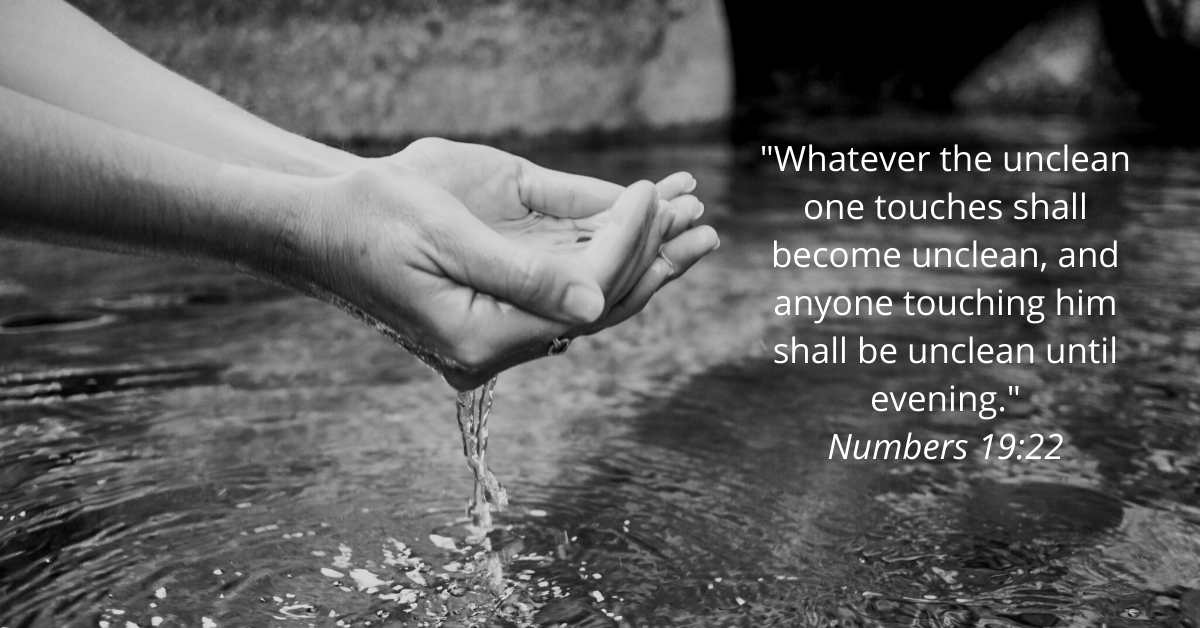A d’var Torah by Lila Corwin Berman for Parshat Chukat-Balak.
“Whatever the unclean one touches shall become unclean, and anyone touching him shall be unclean until evening.” (Numbers 19:22)
In the winter, we cleaned our hands obsessively. I stuffed the kids’ backpacks with hand sanitizers — sprays, wipes, and little bottles harnessed in rubber keychains. I texted them reminders as soon as they arrived at school, before lunch, after lunch, and when the dismissal bell rang. I made up little poems, like: “I know you’ll roll your eyes/but please remember to hand sanitize.”
Each time I watched my kids wash their hands — foam the soap, wash front and back, between fingers, count to 20 — I felt a surge of relief. They were clean. They were well. All was well. Until they entered the world again. And my texts and reminders and rhymes would start again, more powerful than the brief relief I had felt.
Sign up to receive Torah 20/20 in your inbox each week.
In the beginning of our parshah this week, we read about the clean and the unclean, a binary that threads through Jewish text and practice. It serves as a structural logic, allowing us to impose order, especially on experiences, such as death, that unmoor us. The system gives us things to do: Sprinkle the cow ash! Wash your hands! Wait seven days! Wear a mask! Wash your clothes! Stay six feet apart!
In the midst of all my family’s hand cleaning, we started to notice something about the rules we were following: they were meant to move us from a state of potential contamination to certain purity, yet as long as we inhabited a social system, we could never be sure of our purity. Even as we shrunk the boundaries of our social system, we could not close it off entirely. We needed food, the ill needed doctors, children needed laptops and wireless connections, and so on. This awareness was maddening and sobering.
While we tried to cleanse our bodies and everything that entered our home, my white Jewish family and I read about Breonna Taylor, a 26-year-old Black woman murdered by police officers in Kentucky. And then we read about Ahmaud Arbery, a 25-year-old Black man fatally shot while on a run in Georgia. And we saw the video of George Floyd killed by a police officer’s knee to his neck, held there for almost nine minutes, in Minneapolis.
And at some point, I looked down at my hands and my children’s hands, spotless from washing, no dirt under our nails, and I thought about the historical chain of racist violence and state-sanctioned brutality that our hands grasped. Our social system makes certainty of our cleanliness an impossibility. Quite the opposite: we are all unclean, no matter how much we may have washed.
Find more commentaries on Parshat Chukat-Balak.
I am struck by this parshah’s depiction of uncleanliness as a systemic problem that exists beyond the individual. In describing the bizarre ritual of the red heifer, for example, the parshah describes uncleanness as a contagion, spreading even as the priest and his helpers work to eradicate it. Step into the system, even to bring healing or purity, and one cannot avoid being “unclean until evening.” This is how systems work, weaving individuals into logics beyond their own making. The anthropologist Mary Douglas described these rituals as “symbolic systems” and noted that “powers and dangers credited to social structure [are] reproduced in small on the human body.”
When I teach Jewish and American history courses to university students, I try to show them how systems of power enlist individuals — or are “reproduced in small on the human body.” I ask: What policies and laws delimit the kinds of power that different individuals and groups can access? But it’s a tricky, even upsetting, thing to teach because systems are much harder to see, praise, or blame than individuals.
I tell them about American Jews who left cities after World War II, and my students want to know if those Jews were racist — or they want to see an example of a Jewish person who spoke out against white flight. I note their frustration when I answer that the difference between the racist Jew or the one who decried white flight is less profound than the system in which both operated. That system made home financing punishingly expensive and exploitative for African Americans and devalued property in neighborhoods where African Americans settled. My students search for the bright line between clean and unclean, and yet our parshah, as much as history, reminds us that systems act as multipliers of the inequities, injustices, sorrows, and pain that individuals feel or enact.
My children will attest that I haven’t let up on hand washing. “What good does it do?” they ask me, as they count the days of school they have missed, the end-of-year parties canceled, the dreams of summer camp dashed. I tell them we are washing to do something, so our inaction does not grow exponentially. We are washing to take care of ourselves. But right now, our individual efforts are not enough to stop the virus.
The Torah tells us that come evening, we will become clean. Some may see this as permission to sit around and wait for time to do its thing. But history tells us that evening never just comes, that the sun can dip and our eyes can get heavy, but there’s no real rest until we have rolled up our sleeves together and scrubbed hard, first to see and only then perhaps to remove the sick systems of our day.
Lila Corwin Berman is Professor of History at Temple University, where she holds the Murray Friedman Chair of American Jewish History and directs the Feinstein Center for American Jewish History. She is author of The American Jewish Philanthropic Complex: The History of a Multibillion-Dollar Institution (which will be released in the fall of 2020), as well as Metropolitan Jews: Politics, Race, and Religion in Postwar Detroit and Speaking of Jews: Rabbis, Intellectuals, and the Creation of an American Public Identity. Her articles have appeared in the Washington Post, the Forward, and the Jewish Week, as well as several scholarly journals.

